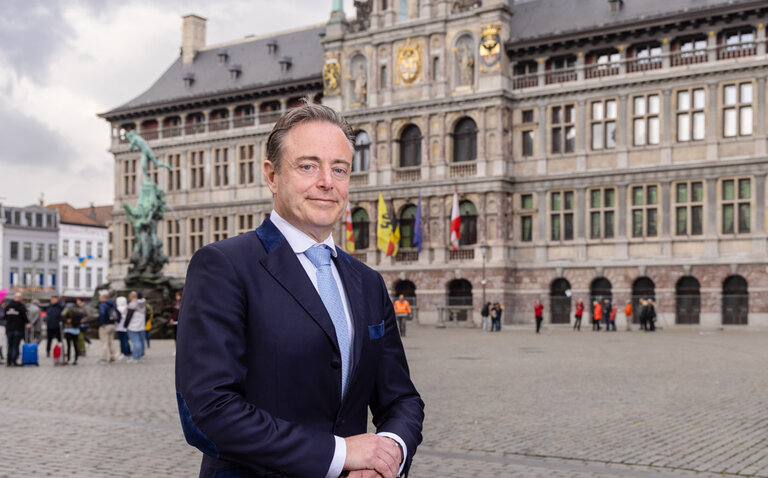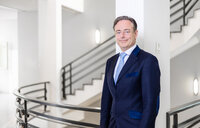
Bart De Wever, Mayor of Antwerp: 'Energy transition offers opportunities for a better life'
The energy transition offers opportunities for a better climate and more prosperity. That is the message Mayor Bart De Wever wants to spread. An important message, both for the support among citizens and for the labor market shortage. But he does need the help of a self-aware industry to do so.
Antwerp is in better shape than ever before. "
The city of Antwerp and its port area are in better shape than ever before. Much is being invested, both in the city in terms of renewal and real estate development and in the port and industry. Under the leadership of Mayor Bart De Wever, investments by the city government itself increased from 150 million to 300 million euros in 2021. This while, at the same time, Antwerp almost completely reduced its historical debts. This in turn attracts new investment, including from abroad. The chemical industry is currently investing billions in the Antwerp region.
'The industry is booming,' says Bart De Wever. 'I am only too happy with the billion-dollar investments that companies like Borealis and Ineos are making here. This is the first time in 20 years that a new cracker is being built in Europe. The most modern and environmentally friendly of its kind, and it can run on green hydrogen in due course. BASF and Air Liquide recently received more than a third of a €1 billion European innovation fund for their CO2 capture and storage project (see also pages 4-5, ed.). So our CO2 capture and storage and hydrogen projects are by no means window-dressing; these are concrete billion-dollar projects. Also, electrification projects are already underway in industry that were thought impossible a few years ago. The bend to the transition has been made, and we can be proud of that!
Transition offers opportunities
According to De Wever, the best way to approach the energy and raw materials transition is from the perspective of the opportunities associated with it. "It bothers me that in the social debate the discussion is mainly conducted in ideological terms. It increasingly seems that economic growth is odious, and that we are doomed to the apocalypse. I don't participate in that. Before the industrial revolution, humans lived to an average age of forty, infant mortality was enormous, and malaria was an endemic disease. I don't want to go back to that, quite the contrary. The transition offers opportunities for a better life. I think that precisely by investing in the economic growth of our industry, while also innovating and coming up with smart new solutions, we can achieve a lot of prosperity. All that knowledge about sustainability and new techniques that we are gaining now, we will soon have to be able to cash in.
Renewable energy
One of the crucial solutions in fighting climate change is a viable energy mix, says De Wever. 'For us in Belgium, that is a big challenge. It bothers me that nuclear energy is currently excluded from that mix on ideological grounds. That is irrational. In the Netherlands it is now said very soberly: we have to get rid of fossil energy, and become independent of Russian gas, so we are stepping into nuclear energy. Here in Belgium this debate has been going on for 20 years without an outcome. But we really need it, in my opinion. Especially in Flanders. Our region has very little natural potential for renewable energy from water, solar and wind; and at the same time is the region with the greatest energy demand and the most energy-intensive industry. If we want enough renewable energy for electrification of industry, I think new and modern mini-nuclear plants are a perfect solution.'
Tight labor market
Another challenge in the transition, also in Antwerp, is the tight labor market. How do you get enough people to implement all the new plans? For some months now Antwerp has had more vacancies than job-seekers," says De Wever, "something we've never experienced before. There is a growing gap between what the companies need and what the urban population can provide. We can only close that gap if more, especially young, people choose to work in engineering and industry. This is precisely where you can make the greatest contribution to combating the climate problem. One of the ways De Wever wants to attract young people into industry is the visible presence of maritime and industrial startups that, in the middle of the city, are working on the challenges of the future. "I think that's important: every potential employee who walks past and sees what's happening there is a soul won.
Besides the city of Antwerp, the industry itself can also do more to raise its profile with tomorrow's solutions, De Wever believes. Industry must come out of its shell. It provides prosperity and solutions to the climate problem, but the ordinary citizen doesn't know about it. Industry should show more pride and communicate more often. Otherwise you only get negative press.
Education
De Wever believes that education also has a role to play in solving the labor market problem. 'In this regard, I look with some envy at Germany, which gears education much better to what the German economy needs. Here, education is still too much a silo in society focused on delivering people with a diploma. But you need to focus on people who can handle the jobs of tomorrow. That starts with a good inventory of what the knowledge and skill needs are. And then bringing people up to that level. There is plenty of talent, we just need to mine it in the right way.'
Image
Although things are going well, De Wever certainly has ambitions for making Antwerp even more competitive. As in the Netherlands, we are running into problems with permits. I think that this is closely related to the image of the port and industry. We have to prevent people from perceiving our most important economic engine as a burden. A poignant example is the recent forced shutdown of the Oosterweel connection for the Antwerp ring road. It is the biggest mobility project of the century in Europe, improving traffic flow, livability and the climate. But what I call “The guerrilla against progress," with the help of an activist judiciary, has unfortunately managed to halt this improvement for the time being. Fierce: "I find that to be maddening and oppose it.’
Merger of seaports
Another dream he cherishes, with which De Wever regularly makes it into the Dutch press, is further cooperation between Flanders and the Netherlands. 'We have an incredible amount in common, why not make better use of it? I dream of one large labor market, one common educational landscape, one large logistics landscape and far-reaching cooperation in fighting crime.' Whether that includes a merger between the ports of Antwerp and Rotterdam? 'We have just carried out a merger between the ports of Zeebrugge and Antwerp. That was certainly not easy, but now it is a great success. It was always unthinkable and it wasn't going to happen, but once the cards were open on the table, it was nevertheless quickly accomplished. I notice that large shipping companies see the nearby ports of Antwerp and Rotterdam as a good opportunity to play off two parties that together form the Gateway to Europe against each other. That is really not wise. So if we could ever join forces... It would make so much sense in purely economic terms; we are only sixty kilometers apart as the crow flies'.
Bart De Wever
Mayor Bart De Wever (1970) was born in Mortsel, studied law and history and became mayor of Antwerp in 2013. He is chairman of the Flemish political party N-VA, a conservative-liberal people's party focused on a strong and autonomous Flanders. Besides his fame as a politician and administrator, he also gained respect through his final spot on the television quiz ‘De Slimste Mens’ and his candor about his obesity. De Wever lost more than fifty kilograms in 2012. From "the fattest" to "the fittest," he calls it himself; these days he runs marathons. While the merger of Flanders and the Netherlands is also one of De Wever's cherished dreams, even he doesn't see that happening just yet. 'But for me it is rather obvious that both countries would be better off, certainly in Europe. It's a long-term project, but we could start with more regional cooperation.'

